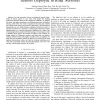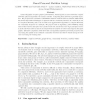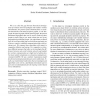401 search results - page 67 / 81 » Sparse Quasi-Random Graphs |
139
click to vote
ICCS
2009
Springer
15 years 9 months ago
2009
Springer
Irregular and sparse scientific computing programs frequently experience performance losses due to inefficient use of the memory system in most machines. Previous work has shown t...
126
click to vote
INFOCOM
2008
IEEE
15 years 8 months ago
2008
IEEE
Abstract—In road networks, sensors are deployed sparsely (hundreds of meters apart) to save costs. This makes the existing localization solutions based on the ranging be ineffect...
119
click to vote
SOFSEM
2007
Springer
15 years 8 months ago
2007
Springer
Prior algorithms known for exactly solving Max 2-Sat improve upon the trivial upper bound only for very sparse instances. We present new algorithms for exactly solving (in fact, c...
125
click to vote
ISCIS
2005
Springer
15 years 7 months ago
2005
Springer
Dense subgraphs of sparse graphs (communities), which appear in most real-world complex networks, play an important role in many contexts. Computing them however is generally expe...
111
click to vote
IPPS
2003
IEEE
15 years 7 months ago
2003
IEEE
We try to close the gap between theoretical investigations of wireless network topologies and realistic wireless environments. For point-to-point communication, we examine theoret...



